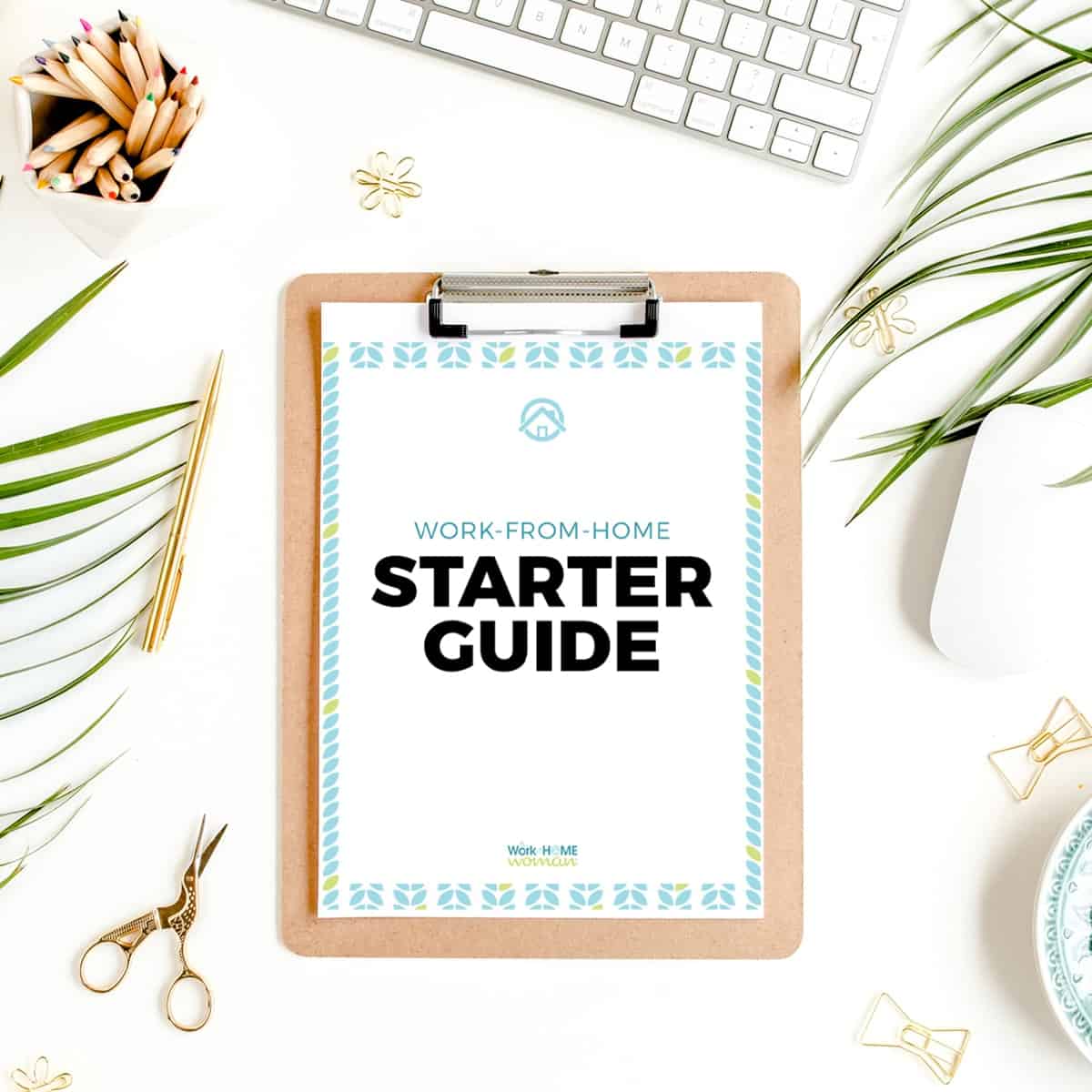Many people dream of working from home. With its flexibility and relaxed dress code, what’s not to love?! However, landing a work from home job can be challenging. Not only do you have to weed through employment scams to find legitimate opportunities, but you’re also competing with hundreds of other job seekers for the same position.
But it’s not all doom and gloom. With advances in technology, there are more legitimate remote jobs than ever before. With these simple tips and some persistence, you can find and land your dream work at home job.
In this article, I’ll cover how to get a work from home job and common occupations that you can do from the comfort of your own home!

What Jobs Can You Do From Home?
Whether you want to work full-time, part-time, or start a side gig, there are tons of remote roles available. However, not all occupations can be done from home.
What are the most common work from home occupations?
Occupations where you’re able to work on a computer and or phone, such as customer service representatives, data entry clerks, graphic designers, sales representatives, social media managers, recruiters, search engine evaluators, virtual assistants, data analysts, and many others. If you’re currently working in a hands-on role, you may need to look at your transferrable skills and pivot to a position that allows a remote work arrangement. For instance, if you’re currently working as a nurse in a hospital, you’ll need to think about telehealth positions or administrative nursing jobs like medical record review.
To work from home, you’ll also need access to a high-speed internet connection, and in many cases, you’ll need to provide your own computer. Depending on your role, you may also need a dedicated workspace where you can shut the door and be free from distractions.
Now that you know what types of positions can be done from home, let’s discuss how to get a work from home job.
1. Figure Out Your Ideal Job
Start by making a detailed list of what you need from a job, for instance, certain work hours, employee benefits, or 1099 jobs. Then, make another list with your current skills, previous work experience, education, passions, hobbies, and strengths. With a clear picture of what you want and what you need in a job, you can begin your remote job search.
If you’re not certain which occupation to explore, use a site like Robert Half or CVS Health. Both have a wide variety of remote occupations and let you search by individual skills. Start searching by a skill that you have and see what remote roles you’re qualified for; you may even find occupations that you didn’t even know existed. Once you have some job titles to search by, move on to the next step.
2. Research Job Listings and Remote Companies
While you can look for remote jobs on big job boards, they are often filled with fake job listings. With advances in tech, scammers can more easily promote their fraudulent opportunities, which means you need to take the time to research the job listing and verify that it is indeed legit. You can do this by going directly to the company’s website and viewing the job listing there.
You can also use a paid remote job site like FlexJobs, where researchers screen all of the job postings for legitimacy.
When you’re looking for work from home jobs, some red flags to watch out for are poor spelling and grammar, high pay for entry-level work, job listings that use urgency, vague job descriptions, interviews conducted via text or messaging apps like WhatsApp or Telegram, and free email addresses like Hotmail, Yahoo, and Gmail. You should also look for an About Page that tells the history of the company and a little bit about its founder, and you should be able to find the founder on LinkedIn, too. People who are promoting scams don’t want to be found, so they hide behind PO Boxes, free email accounts, and stock or generated AI photos.
It’s also a good idea to look at reviews on sites like Glassdoor.com, Better Business Bureau, and Trustpilot. You can also explore LinkedIn and reach out to former employees of a company to learn about their experiences with the company. Conducting informational interviews can also be a good way to figure out if a company or role is going to be a fit for you.
The more research you do, the better chance you have of finding reputable companies whose values and interests mirror your own; so you can help to ensure the best possible fit while avoiding job scams.
3. Write a Winning Resume
For any job search, you need to update and polish your resume. Work from home jobs are highly coveted positions, and employers are looking for the best candidates. Update and freshen your resume, references, and cover letter to ensure that yours stands out from the crowd.
Remember to tailor your resume to each specific job you are applying for. Almost all resumes are scanned by applicant tracking software (ATS), which searches for keywords and phrases used in the job listing. If you’re struggling with this step, you can use a service like Jobscan, which scans and optimizes your resume to boost your chances of landing an interview.
If you’ve been out of the workforce for a while, remember to document this and add noteworthy accomplishments that may boost your creditability, such as volunteer experience, helping with a family business, blogging, social media experience, and certificates or courses you’ve taken online.
If you’re asked to complete an application instead of a resume, be sure to answer every single question and respond in complete sentences with proper spelling, punctuation, and grammar. If there is a long-form question, take the time to elaborate on your answer. The more enthusiasm and detail you can provide, the better.
If you’re struggling with writing your resume, or you’ve sent out a bunch of resumes without getting a single callback, grab The Ultimate Resume Template Bundle! This bundle will help you easily write a resume and cover letter that gets results!
4. Connect With Your Network
I’m always talking about networking, and there’s a reason why – it’s because networking works! Out of my last 4 jobs, 3 out of the 4 I landed through networking, and here’s why. First, people are more apt to trust a known person’s recommendation over a stack of totally unknown resumes.
Secondly, people enjoy helping other people out, so let it be known that you are searching for a work from home job. Start by telling your friends and family that you’re looking for a home-based position and, if they hear of anything, to let you know. With social media networks like Facebook and LinkedIn, getting connected and staying connected is easier than ever. And as they say, it’s not so much who you know but who your contacts know.
After you’ve approached your existing network, try attending some in-person or online networking events. You can explore sites like Meetup or Eventbrite or test out the professional networking app Fishbowl. With this app, you can ask questions without disclosing your name, attend industry talks, and connect with other like-minded professionals.
5. Polish Your LinkedIn Profile
Nowadays, it’s expected that you have a professional presence on LinkedIn. So, if you’re new to the social network, it’s time to set up your profile. And if you already are established on LinkedIn, be sure to use these tips to freshen up your profile.
With LinkedIn, you’ll set up a professional profile that highlights your skills, experience, and education. The information you add to LinkedIn should match what you have on your resume, as many hiring managers and recruiters compare the two. Be sure to include a professional-looking headshot and keywords from your industry, as you want recruiters to find you easily.
Next, connect with former co-workers and colleagues; you can also join various industry-related groups, such as alumni groups, professional groups, and company-sponsored groups.
You can also search for remote jobs on LinkedIn. Just type in the occupation you’re looking for, choose the remote job filter and click search. LinkedIn also allows you to set up job alerts, so you’ll always be aware of new openings in your desired field.
Check out this article for tips on how to make your LinkedIn profile stand out.
6. Use Helpful Job Tools and Apps
If there were tools that could make your job search easier, why wouldn’t you use them?! Try adding a couple of these to your efforts, and I’ll bet you see faster results.
FlexJobs is a paid membership site that posts flexible work arrangements, like telecommuting, part-time, and freelance positions. On FlexJobs, they screen all of their jobs before posting, so you can rest assured that you’re never dealing with a scam company. There is a small membership fee, but it is well worth it for the time you’ll save not having to weed through scams. They also have a feature where you can set up job alerts and have new job openings sent directly to your inbox. FlexJobs also has many other perks and benefits like free training webinars and online career fairs for members, you can read about them in my FlexJobs review.
Need a way to keep all of your job searches organized? Try using a career management tool, like my Work From Home Career Planner. With this printable bundle, you can organize and manage your job searches, track your personal and professional relationships, target companies, and track jobs that you’ve applied to. But most importantly, it will help you identify and steer clear of employment scams.
Looking for jobs that pay six figures? Try out the paid membership site, Ladders. On Ladders, they only have high-paying jobs that pay six figures. They also have a host of career tools to help you with your resume, applications, ATS optimization, and more.
You can also use AI to help you with your job search! Careerflow.ai is an automated tool that can help you track jobs, optimize your LinkedIn profile, build your resume, and more.
7. Practice Your Interviewing Skills
Before you land the interview, you need to take time to practice your interviewing skills. One of the best ways to do this is to gather a list of standard interviewing questions and practice answering them out loud. Do this over and over again until you’re comfortable answering them on the spot.
You can also record yourself answering questions on video, practice with a friend or family member, or even use a mock interviewing platform. By doing this extra step, you’ll be more aware of unwanted body language, facial expressions, and words and phrases that you might be using.
Along with this, you need to research the company thoroughly and know some background information on them. Most companies will ask the question: Why do you want to work for us? and you need to come up with a good answer. Having background knowledge of the company will help you to answer the question and it shows the interviewer that you’re well prepared (a quality that employers are looking for).
Lastly, be sure to come up with a few questions to ask the interviewer. Stay away from questions about salary and benefits and lean into questions about job duties, department structure, growth opportunities, and company culture.

8. Dress for Success
Along with practicing your interviewing skills, you need to be prepared for the interview by looking the part. You only have one chance to make a good first impression, so prepare ahead and make sure that you have an appropriate outfit or two for your interviews. Dressy slacks, a button-down shirt, a blazer, and some heels will do the trick. Finish the look off by paying attention to the small details: clean nails (no chipped polish), clean hair (maintain your cut and color), and minimal accents (jewelry, makeup, or perfume).
While many remote positions will require that you interview via video or over the phone, you still should dress up just as you were going to meet them in person. As they say, if you look good, you feel good – and this will come across in your tone, attitude, and mannerisms.
9. Follow-Up With Employers
After you’ve applied for a job, send a follow-up message. Sending one right after you apply is an excellent way to make your name stand out from a stack of applicants. As somebody who hires freelancers, I can tell you that almost nobody does this step, so when I get a follow-up email, it makes an impression.
Sending a follow-up will ensure that your resume reaches the correct recipient, and it shows that you are a person who takes the initiative. With this being said, don’t be pesky. One to two follow-up messages should be sufficient unless you’re given instructions to call or message them again at a specific time.
Did you score an interview? Awesome! Now, remember to send a thank-you note within 24 hours of the interview. Handwritten notes tend to score the most points with managers, but if they are making a decision quickly or you don’t have a physical mailing address, a thank-you email will work perfectly fine, and it helps you to stand out from other applicants.
10. Don’t Give Up
According to FlexJobs, it takes the average job-seeker 3-6 months to land a new job, depending on the individual, industry, and the state of the economy. I’ve also heard that it usually takes 1 month of search time for each $10,000 you want to earn. So, if you want to make $70,000 annually, it will likely take you at least 7 months to land a new job. The key is to be patient and persistent, stay organized, and do a little each day. If you start to feel frustrated, take a day off or find a support group on Meetup. It has various groups in different locations just for unemployed individuals.
How to Get a Work From Home Job Wrapup
While there are many steps involved in getting a work from home job, you don’t have to do them all in one day. Start with a spreadsheet or my Work From Home Planner, and begin taking steps toward your goal of landing a remote job. As you start taking action steps toward your goal, the momentum will build and the easier it becomes. And before you know it, you’ll be getting callbacks and landing the work from home job of your dreams!
How did you get a work from home job? What tips and job search tools do you recommend?
Originally published January 11, 2012. Content updated in May 2024.









Yes connecting your social media bases is a good way to find work at home opps. But #10 persistence is key
Honestly, I think #10 is the most important. Persistence is the key to finding the right work at home job.
I totally agree, Lisa! Thanks for stopping by!
Thank you for sharing this great list.
Glad you enjoyed the tips, Jessica!
I am a newby when it comes to home based businesses. I have been a stay at home mom now for over 13 years. Any advice or help would be appreciated!!! Thanks so much :)
Very true, this applies to any job search. Thanks for stopping by Donna!
pretty comprehensive list you put together! the tips and advice you gave works for every job seeker – not just those looking to work from home. as always, thank you for sharing your expertise with us.
Hi Holly, its really pleasant to be here and going through this nice post. There are certain problems while finding work at home jobs. These points will be helpful to sort out such problems. Keep it up.
Thanks Anne – good luck!
These are all excellent points Holly! Connecting with your network is extremely important – It seems as though a mass of people get work from who they know. Opening up to your network can open many doors, and potentially bring you business when you do land your work from home job!
Glad you enjoyed the post Carissa! I think connecting with your network is the most important step in the process. As they say, it’s not what you know but who you know.